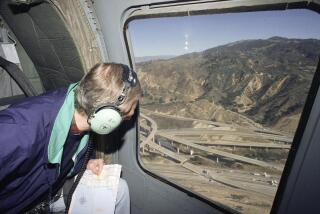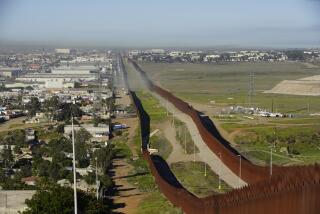Mexico to Buy Failing Private Toll Highways
- Share via
MEXICO CITY — Its multibillion-dollar experiment in private toll roads in shambles, the Mexican government said Friday that it will bail out 25 of the 52 privately built and operated highways to the tune of about $7.8 billion.
Mexican Secretary of Communication and Transportation Carlos Ruiz Sacristan admitted that the private roads program had been a failure because of excessively high tolls, inadequate planning and overly ambitious construction projects.
The government will assume $7.8 billion in debt and take over operation of the highways. It expects that over 15 years the toll revenue will repay all but $2.5 billion of the debt it is taking on.
Although analysts do not expect the bailout to jeopardize the government’s financial condition, some worried about the impact on concessionaires whose $3.5-billion equity investment will be wiped out. Among the hardest hit are giant Mexican construction firms ICA, Grupo Tribasa and GMD, whose shares are traded on the New York Stock Exchange.
The private toll road plan, begun in the late 1980s, was a favorite of former President Carlos Salinas de Gortari because it shifted financial responsibility for construction of Mexico’s much-needed new infrastructure to private concessionaires, or so he thought.
The undertaking has left Mexico with a 3,300-mile network of modern highways carrying hardly any traffic--because the private concessionaires who built them are charging tolls ranging from $20 for short hauls to hundreds of dollars for truckers.
Ruiz Sacristan said the bailout would include an immediate reduction in tolls by an average 30% for trucks and 13%-15% for cars in hopes of generating more traffic volume. Whether those cuts will be enough to significantly boost usage remains to be seen.
As originally envisioned, private companies would build more than 3,000 miles of toll roads and operate them for 15 years, collecting the tolls to pay off their costs and clear a profit before turning them over to the government.
But the concessionaires badly overestimated traffic and underestimated the engineering challenges represented by Mexico’s often-tortuous terrain. Construction cost overruns averaged 26% of projections, Sacristan said, and many Mexicans found the tolls charged by some of the operators to be exorbitant.
Among the toll roads the government is taking over is an ultramodern 165-mile stretch from Cuernavaca to Acapulco that wends through desert and down into lush coastal zones favored by tourists. The toll: $45 for cars and $200 for trucks.
The economics of the toll roads were undercut by the 1994 peso devaluation and the subsequent rise in interest rates on the variable-rate construction loans that financed many of the highways.
It didn’t help concessionaires that Mexican law required that toll roads be built only along adjacent free roads, giving motorists the choice of a cheaper but usually more time-consuming and rundown alternative.
As a result, the concessionaires have not been collecting enough revenue to pay their debts and maintain the system, Ruiz Sacristan said Friday. The government has been stepping in to aid some projects financially almost from the inception, helping with bank payments and upkeep, sources said.
The bailout will save further deterioration of the highways, Ruiz Sacristan said, and resolve a long-standing financial uncertainty surrounding the roadways. The settlement of the issue, which has left Mexico’s giant construction firms in financial limbo, is a positive, said Mexico City-based economist Jonathan Heath.
The concessionaires have not formally signed off on the terms of the bailout, Sacristan said. While much of the 3,300-mile toll network is underused and deteriorating, some of it, notably the Tijuana-Tecate stretch in Baja California, has been financially successful. Those roads will continue under concessionaires’ operation.
More to Read
Sign up for Essential California
The most important California stories and recommendations in your inbox every morning.
You may occasionally receive promotional content from the Los Angeles Times.













